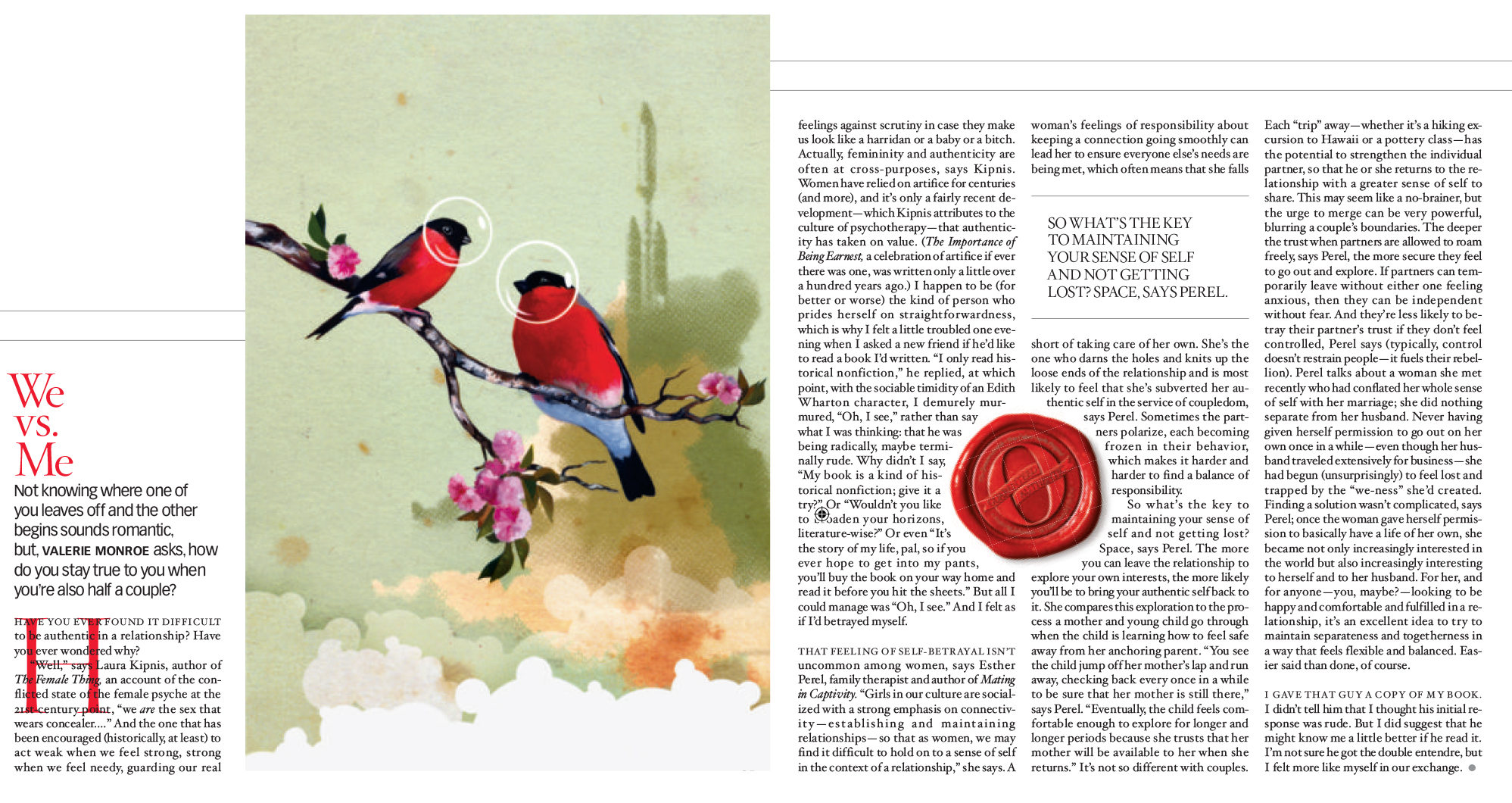We Vs. Me
Not knowing where one of you leaves off and the other begins sounds romantic, but, VALERIE MONROE asks, how do you stay true to you when you’re also half a couple?
Have you ever found it difficult to be authentic in a relationship? Have you ever wondered why?
“Well,” says Laura Kipnis, author of The Female Thing, an account of the conflicted state of the female psyche at the 21st-century point, “we are the sex that wears concealer.…” And the one that has been encouraged (historically, at least) to act weak when we feel strong, strong when we feel needy, guarding our real feelings against scrutiny in case they make us look like a harridan or a baby or a bitch. Actually, femininity and authenticity are often at cross-purposes, says Kipnis. Women have relied on artifice for centuries (and more), and it’s only a fairly recent development—which Kipnis attributes to the culture of psychotherapy—that authentic-ity has taken on value. (The Importance of Being Earnest, a celebration of artifice if ever there was one, was written only a little over a hundred years ago.) I happen to be (for better or worse) the kind of person who prides herself on straightforwardness, which is why I felt a little troubled one evening when I asked a new friend if he’d like to read a book I’d written. “I only read historical nonfiction,” he replied, at which point, with the sociable timidity of an Edith Wharton character, I demurely murmured, “Oh, I see,” rather than say what I was thinking: that he was being radically, maybe terminally rude. Why didn’t I say, “My book is a kind of historical nonfiction; give it a try?” Or “Wouldn’t you like to broaden your horizons, literature-wise?” Or even “It’s the story of my life, pal, so if you ever hope to get into my pants, you’ll buy the book on your way home and read it before you hit the sheets.” But all I could manage was “Oh, I see.” And I felt as if I’d betrayed myself.
That feeling of self-betrayal isn't uncommon among women, says Esther Perel, family therapist and author of Mating in Captivity. “Girls in our culture are socialized with a strong emphasis on connectivity—establishing and maintaining relationships—so that as women, we may find it difficult to hold on to a sense of self in the context of a relationship,” she says. A woman’s feelings of responsibility about keeping a connection going smoothly can lead her to ensure everyone else’s needs are being met, which often means that she falls short of taking care of her own. She’s the one who darns the holes and knits up the loose ends of the relationship and is most likely to feel that she’s subverted her authentic self in the service of coupledom, says Perel. Sometimes the partners polarize, each becoming frozen in their behavior, which makes it harder and harder to find a balance of responsibility.
So what’s the key to maintaining your sense of self and not getting lost? Space, says Perel. The more you can leave the relationship to explore your own interests, the more likely you’ll be to bring your authentic self back to it. She compares this exploration to the process a mother and young child go through when the child is learning how to feel safe away from her anchoring parent. “You see the child jump off her mother’s lap and run away, checking back every once in a while to be sure that her mother is still there,” says Perel. “Eventually, the child feels comfortable enough to explore for longer and longer periods because she trusts that her mother will be available to her when she returns.” It’s not so different with couples. Each “trip” away—whether it’s a hiking excursion to Hawaii or a pottery class—has the potential to strengthen the individual partner, so that he or she returns to the relationship with a greater sense of self to share. This may seem like a no-brainer, but the urge to merge can be very powerful, blurring a couple’s boundaries. The deeper the trust when partners are allowed to roam freely, says Perel, the more secure they feel to go out and explore. If partners can temporarily leave without either one feeling anxious, then they can be independent without fear. And they’re less likely to betray their partner’s trust if they don’t feel controlled, Perel says (typically, control doesn’t restrain people—it fuels their rebellion). Perel talks about a woman she met recently who had conflated her whole sense of self with her marriage; she did nothing separate from her husband. Never having given herself permission to go out on her own once in a while—even though her husband traveled extensively for business—she had begun (unsurprisingly) to feel lost and trapped by the “we-ness” she’d created. Finding a solution wasn’t complicated, says Perel; once the woman gave herself permission to basically have a life of her own, she became not only increasingly interested in the world but also increasingly interesting to herself and to her husband. For her, and for anyone—you, maybe?—looking to be happy and comfortable and fulfilled in a relationship, it’s an excellent idea to try to maintain separateness and togetherness in a way that feels flexible and balanced. Easier said than done, of course.
I gave that guy a copy of my book. I didn’t tell him that I thought his initial response was rude. But I did suggest that he might know me a little better if he read it. I’m not sure he got the double entendre, but I felt more like myself in our exchange.

